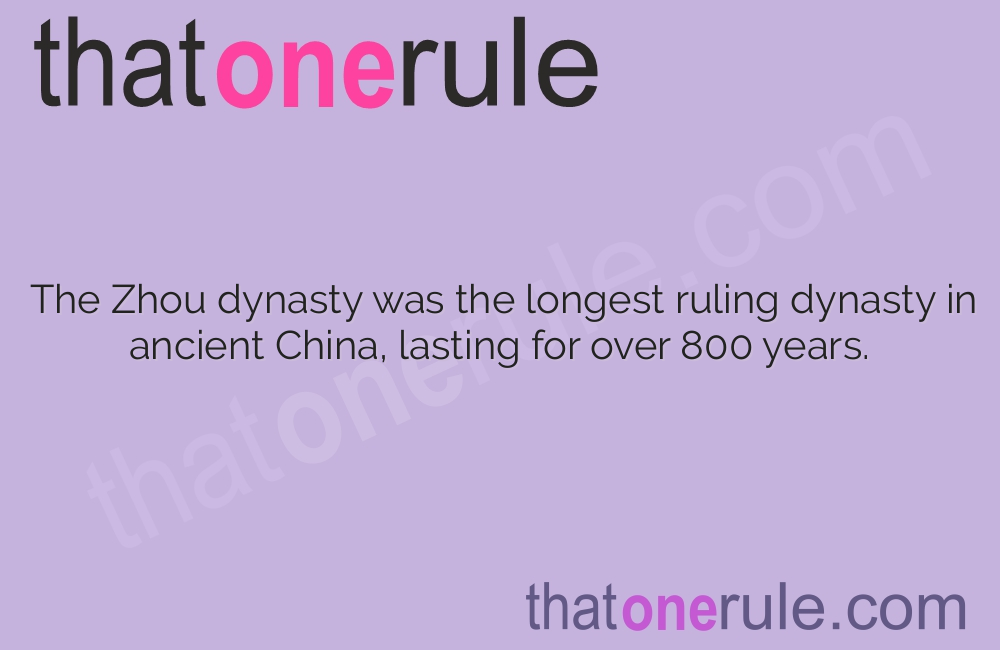Zhou Dynasty – Exploring Ancient Chinese History

The Zhou dynasty was the longest ruling dynasty in ancient China, lasting for over 800 years.
The Zhou dynasty is known for its political and cultural innovations.
King Wu of Zhou established the Zhou dynasty in 1046 BC.
The Zhou dynasty is often regarded as a golden age in Chinese history.
The Mandate of Heaven was a key concept in the Zhou dynasty, linking the emperor’s rule to divine approval.
The Zhou dynasty saw the development of a centralized and bureaucratic government.
The Zhou dynasty was divided into the Western Zhou (1046–771 BC) and Eastern Zhou (770–221 BC) periods.
During the Zhou dynasty, iron tools and weapons became more widespread.
The Zhou dynasty was characterized by its emphasis on agriculture and farming.
The Book of Songs, also known as the Classic of Poetry, was compiled during the Western Zhou period.
Confucius, one of the most influential philosophers in Chinese history, lived during the Zhou dynasty.
The Zhou dynasty witnessed the rise of feudalism, with the ruling class granting land to loyal nobles.
The Zhou dynasty introduced the concept of the Five Elements, which explained the interactions between different natural phenomena.
The Zhou dynasty valued education and placed importance on the study of literature and history.
The Zhou dynasty’s decline began during the Spring and Autumn period (771–476 BC), marked by political turmoil and fragmented power.
Zhou Dynasty – Exploring Ancient Chinese History part 2
The Zhou dynasty’s military was structured around a system of chariot warfare.
Duke Huan of Qi, a ruler during the Zhou dynasty, is considered one of the greatest military strategists in Chinese history.
The Zhou dynasty fostered the growth of various philosophies, including Confucianism, Daoism, and Legalism.
The Great Wall of China, although primarily associated with later dynasties, was started during the Zhou dynasty.
The Zhou dynasty had strong cultural ties with neighboring regions, particularly in the realm of bronze casting.
The Zhou dynasty saw advancements in bronze metallurgy, with highly intricate and artistic designs.
Rituals and divination played a significant role in the religious practices of the Zhou dynasty.
The Zhou dynasty’s feudal system eventually led to the rise of independent warlords and the disintegration of central authority.
The decline of the Zhou dynasty paved the way for the Warring States period (475–221 BC).
The Zhou dynasty’s influence can still be seen in present-day Chinese culture, particularly in Confucian teachings.
The Zhou dynasty’s territory extended far beyond modern-day China, reaching into regions such as Tibet and parts of Central Asia.
The Zhou dynasty favored a decentralized governance system, with regional rulers given considerable autonomy.
The Eastern Zhou period is known as a time of cultural flowering and intellectual debate.
During the Zhou dynasty, bronze vessels were not only used for practical purposes but also as symbols of power and status.
The decline of the Western Zhou dynasty was partially caused by invasions from nomadic tribes known as the Rong and Di.
The Zhou dynasty’s political system was based on the concept of the king as the ultimate authority, but his power was limited by the nobility.
The Zhou dynasty’s rulers often faced challenges from regional lords and rebellious vassals.
The Zhou dynasty’s capital was initially located in Haojing (present-day Xi’an) and later moved to Luoyi (present-day Luoyang).
The Zhou dynasty was divided into numerous states during the Spring and Autumn period, leading to frequent warfare and power struggles.
The Zhou dynasty’s decline coincided with the emergence of philosophical schools that sought to address the social and political unrest.
The Zhou dynasty was known for its cultural achievements, including advancements in literature, music, and art.
The Zhou dynasty’s political philosophy emphasized the importance of ruling by virtue and benevolence.
The Zhou dynasty adopted many cultural practices and traditions from the Shang dynasty, which it overthrew.
The Zhou dynasty is credited with the development of a standardized writing system based on characters and symbols.
The Zhou dynasty’s decline was hastened by internal conflicts, economic problems, and external invasions.
The Zhou dynasty’s influence on subsequent dynasties is evident in their adoption of Zhou administrative practices and philosophies.
The Zhou dynasty established a feudal hierarchy based on loyalty, kinship, and mutual obligations.
The Zhou dynasty’s decline led to a period of political fragmentation and chaos, known as the Warring States period.
The Zhou dynasty’s fall in 221 BC marked the end of the ancient Chinese dynastic cycle.
The Zhou dynasty’s legacy lives on through its contributions to Chinese language, philosophy, and political organization.

